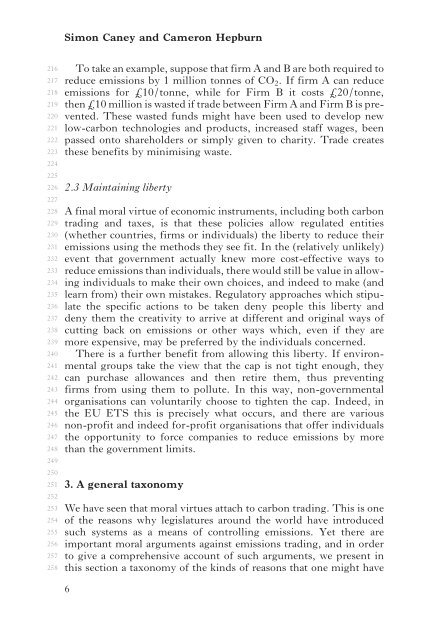Carbon Trading: Unethical, Unjust and Ineffective? - Global ...
Carbon Trading: Unethical, Unjust and Ineffective? - Global ...
Carbon Trading: Unethical, Unjust and Ineffective? - Global ...
You also want an ePaper? Increase the reach of your titles
YUMPU automatically turns print PDFs into web optimized ePapers that Google loves.
Simon Caney <strong>and</strong> Cameron Hepburn<br />
216<br />
217<br />
218<br />
219<br />
220<br />
221<br />
222<br />
223<br />
224<br />
225<br />
226<br />
227<br />
228<br />
229<br />
230<br />
231<br />
232<br />
233<br />
234<br />
235<br />
236<br />
237<br />
238<br />
239<br />
240<br />
241<br />
242<br />
243<br />
244<br />
245<br />
246<br />
247<br />
248<br />
249<br />
250<br />
251<br />
252<br />
253<br />
254<br />
255<br />
256<br />
257<br />
258<br />
To take an example, suppose that firm A <strong>and</strong> B are both required to<br />
reduce emissions by 1 million tonnes of CO 2 . If firm A can reduce<br />
emissions for £10/tonne, while for Firm B it costs £20/tonne,<br />
then £10 million is wasted if trade between Firm A <strong>and</strong> Firm B is prevented.<br />
These wasted funds might have been used to develop new<br />
low-carbon technologies <strong>and</strong> products, increased staff wages, been<br />
passed onto shareholders or simply given to charity. Trade creates<br />
these benefits by minimising waste.<br />
2.3 Maintaining liberty<br />
A final moral virtue of economic instruments, including both carbon<br />
trading <strong>and</strong> taxes, is that these policies allow regulated entities<br />
(whether countries, firms or individuals) the liberty to reduce their<br />
emissions using the methods they see fit. In the (relatively unlikely)<br />
event that government actually knew more cost-effective ways to<br />
reduce emissions than individuals, there would still be value in allowing<br />
individuals to make their own choices, <strong>and</strong> indeed to make (<strong>and</strong><br />
learn from) their own mistakes. Regulatory approaches which stipulate<br />
the specific actions to be taken deny people this liberty <strong>and</strong><br />
deny them the creativity to arrive at different <strong>and</strong> original ways of<br />
cutting back on emissions or other ways which, even if they are<br />
more expensive, may be preferred by the individuals concerned.<br />
There is a further benefit from allowing this liberty. If environmental<br />
groups take the view that the cap is not tight enough, they<br />
can purchase allowances <strong>and</strong> then retire them, thus preventing<br />
firms from using them to pollute. In this way, non-governmental<br />
organisations can voluntarily choose to tighten the cap. Indeed, in<br />
the EU ETS this is precisely what occurs, <strong>and</strong> there are various<br />
non-profit <strong>and</strong> indeed for-profit organisations that offer individuals<br />
the opportunity to force companies to reduce emissions by more<br />
than the government limits.<br />
3. A general taxonomy<br />
We have seen that moral virtues attach to carbon trading. This is one<br />
of the reasons why legislatures around the world have introduced<br />
such systems as a means of controlling emissions. Yet there are<br />
important moral arguments against emissions trading, <strong>and</strong> in order<br />
to give a comprehensive account of such arguments, we present in<br />
this section a taxonomy of the kinds of reasons that one might have<br />
6
















